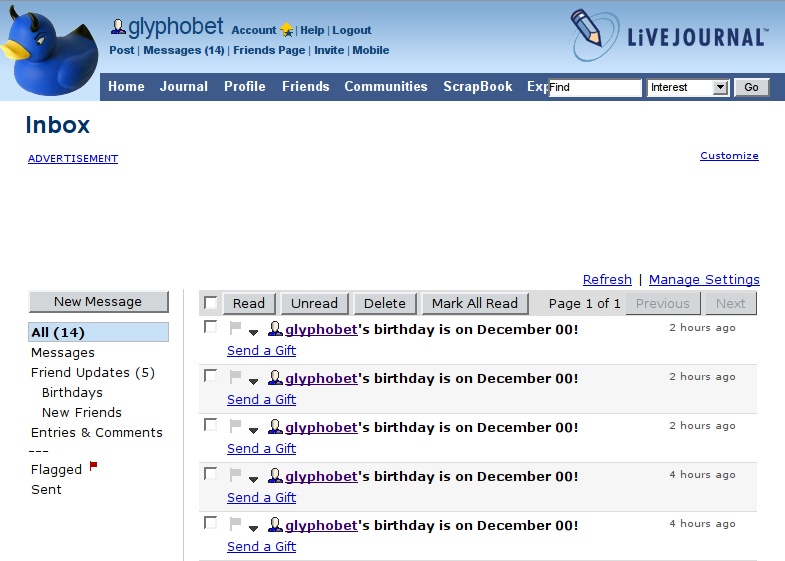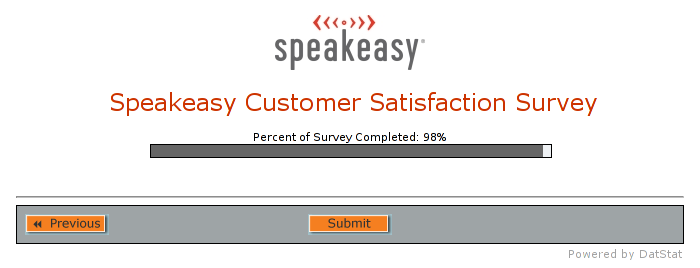They watch the lights on your server go blinkety-blink. Blinkety-blink.
Tag Archives: internet
Happy Birthday from LiveJournal
I woke up this morning to five identical emails from LiveJournal. Here’s my LiveJournal inbox:
What’s wrong with this picture?
- I don’t ever need to be notified of my own birthday. It’s on my driver’s license if I forget it.
- I don’t need to be notified of anyone’s birthday more than once. And five times in two hours? Really excessive.
- I never asked LiveJournal to share my birthday with anyone, yet upon further investigation, I found that my birthday was set to be “shared with everyone.” Birthdates are often used to verify identity; they are a common target of identity thieves. No site should ever default to sharing user’s birthdates (or any other private information) with the universe. One nice way to mitigate this threat is to not include the birth year, which is not important when reminding people of each other’s birthdays.
- The messages show my birthday as the nonexistent “December 00,” even though I entered my birthday as January 1st. (I never enter my real birthdate on any site; January 1st works because it’s easy to remember, and anybody who actually knows me will know January 1st is not right.)
- If I actually wanted this feature, it would be nice to have more than two days to find a gift for someone.
I don’t actually use LiveJournal; I’ve only occasionally used my account to post a comment. I assume this is not indicative of the quality of the rest of their site.
It’s never boring in Russia
They have wooden computers, faked UFO photos, and dangerous staged photo contests.
More maps
The New York times has a neat interactive campaign finance map. The candidates would do well to study the following informative maps too.
Maps of War has mostly silly FOX “news” style infographics, but History of Religion and Imperial History are both great.
You can map all sorts of indicators of globalization at Gapminder.
The National Snow and Ice Data Center has a map of the arctic isotherm and treeline. Watch this real estate — it’ll be booming unless the next president (see first map) ratifies Kyoto and turns our ship of state around.
And CIO has a purty map of who owns the internet.
And the description is center-embedded too
Someone do me a favor and take a screen-shot of this and post it on Flickr, k thx.
Update 2007-Dec-10: Thanks Piper!
Update 2007-Dec-12: infinite flickr project
Facing pages
Ars Technica would have you believe that the lack of facing pages in “e-book” gadgets like Amazon’s Kindle is the missing killer feature.
The solution to this problem is obvious and straightforward: design all e-book readers to display pairs of pages in the traditional, facing-page format in which books were designed to be read.
Vacuous Survey
New social networking sites to keep an eye out for
- prefacebook.com : Please read this before viewing profiles. Thanks.
- shitfacebook.com : Which friend are you going to get wasted with tonight? (thanks to Diego)
- palefacebook.com : Like latenightshots.com, only they’re honest about only letting in privileged white people.
- whatshisfacebook.com: What was that person’s name again?
- boldfacebook.com : FOR GRANDMA WHO TYPES EVERYTHING IN ALL CAPS BECAUSE SHE’S GOING BLIND AND/OR THE FONT ON HER COMPUTER IS TOO SMALL.
- effacebook.com : For those personality traits that you’d rather people not know about… fill out your profile and we’ll show it to no-one.
- twofacebook.com : for your other online personality, the one you don’t let people see until it’s too late.
- self-effacebook.com : Are you a sarcastic bastard with low self-esteem and a lot of charm?
- savefacebook.com : Embarrassed? Insulted someone important? Major faux-pas?
- defacebook.com : Edit someone else’s profile for a change. Preferably someone you hate.
WebKit adds embeddable font support
Embeddable fonts in webpages; we only had to wait nine years for a browser to implement this. Yet another reason to hold my breath for a WebKit browser on Xorg.
False positives, false negatives
You’ve probably already read the news about Microsoft’s broken anti-piracy system breaking down completely over the last weekend. This caused an unknown, but presumably large, number of legitimate copies of Windows to be marked as pirated.
This video, however, shows an Ubuntu Linux computer running Wine, a Windows emulator, and IE 6 from ies4linux, running the same anti-piracy validation software. And the punchline? The validation succeeded; Microsoft’s program marked the computer as legitimate.
Of course, everything happening in this video is legitimate; Wine is a totally legal reverse-engineering of the Windows system libraries, and ies4linux works by downloading all the necessary, freely available parts of IE 6 from Microsoft and installing them. All legal, assuming you own a copy of Windows. But wouldn’t you expect that the anti-piracy tool from one of the biggest software companies in the world would notice that it was being run on what is effectively a different operating system?

